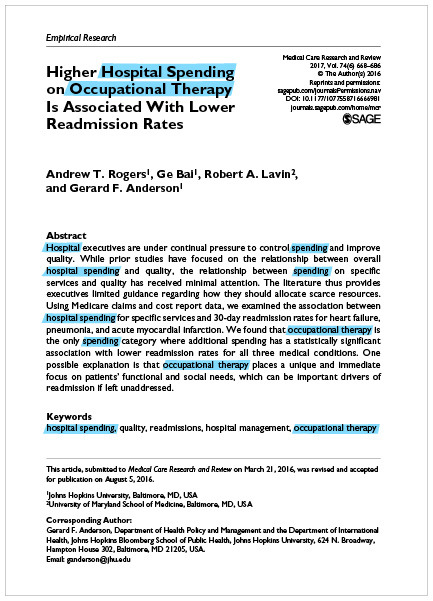You are in: Asia
Change location
You are here
Help Readers Find Your Article
- The importance of search engines
- What do search engines look at?
- So what can you do to help?
3.1 Repeat key phrases in the abstract while writing naturally
3.2 Get the title right
3.3 Choose your key words carefully
3.4 Link to your article
3.5 Summary - Example of an article optimized for search engines
The importance of search engines
Google and Google Scholar are the principal ways in which people will find your article online today. Between them they account for 60% of referral traffic to Sage Journals Online. The search engine is now the first port of call for researchers and it is of paramount importance your article can be found easily in search engine results.
By taking some simple steps to optimize your article for search engines it will help your work to be discovered, then read, used and cited in others’ work. This helps with the ISI Impact Factor of the journal your article is published in and will further raise the visibility of your article.
Sage already undertakes many measures to ensure Sage journals are indexed in the all the major search engines. There are over 100 factors that a search engine will look at before deciding how to rank your article in their search results, but the starting point is the content that you write.
What do search engines look at?
Today’s search engines use secret complex mathematical algorithms that change several times a year to keep their search results as accurate as possible. They take into account over 100 different factors and do not disclose the weighting or importance of each. Below are just a few of the elements considered today by search engines:
|
|
So what can you do to help?
Repeat key phrases in the abstract while writing naturally
Search engines look at the abstract page of your article, which is free for everyone to look at on Sage Journals Online. Your abstract is not only the sales pitch that tempts the researcher into reading your article, it’s also the information that gives a search engine all the data it needs to be able to find your article and rank it in the search results page.
Try to repeat the key descriptive phrases. Try to imagine the phrases a researcher might search for if your paper would be of interest to them. Google can detect abuse of this so don’t overplay it, focus on just 3 or 4 key phrases in your abstract.
Ensure the main key phrase for your topic is in your article title. Make sure your title is descriptive, unambiguous, accurate and reads well. Remember people search on key phrases not just single words e.g., ‘women’s health’ not ‘health’. Also try to include the topic as close to the start as possible. If you're using a 'creative' title, make this a subtitle to a more descriptive title. A descriptive title is also good for making an article more searchable in MEDLINE or Web of Science.
Choose your key words carefully
Include your main 3 or 4 key phrases and add in at least 3 or 4 additional key words. Where more than one phrase (or abbreviation) is often used to describe the same thing, include both/all variants, e.g., drug names.
Use descriptive sub-headings
On Sage Journals, sub-headings receive high importance with search engines.
Link to your article
As well as optimizing the content, you should link to your article and encourage others to do so, as the number of backlinks is Google’s main signal for how authoritative a page is. As is true with the guidelines above, don't go so far so that it's 'spammy'.
- What key phrases would you give a search engine if you were searching for your own article?
- Write for your audience but bear in mind how search engines work too
- Write a clear title with your main key phrase and topic in it
- Write an abstract and choose keywords re-iterating 3 or 4 key phrases
- Use descriptive sub-headings and supply image descriptions for figures and images
- Keep it natural - Google will un-index your article if you go overboard on the repetition
The better you write your abstract, the better chance you are giving your article to appear high up in the search results rankings. This is vitally important as researchers will rarely investigate beyond the first 20 results from Google.
Example of an article optimized for search engines
This article comes out top in Google Scholar on a search of ‘hospital spending occupational therapy’. These are keywords that researchers are likely to search for. These search terms are highlighted in the sample article so you can see the patterns of repeated phrases that Google looks at.
Key points to note:
- A clear and descriptive title including main key terms or phrases: Higher Hospital Spending on Occupational Therapy Is Associated With Lower Readmission Rates
- Abstract repeats key phrases in a contextually natural way: hospital, spending, occupational therapy
- Key terms or phrases are also repeated in keywords field: hospital spending, quality, readmissions, hospital management, occupational therapy
- Many other factors influence ranking but this content is written in a way that gives it the best chance

